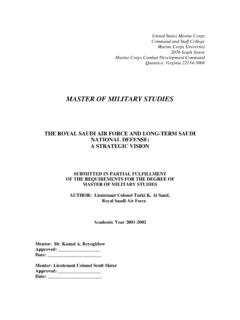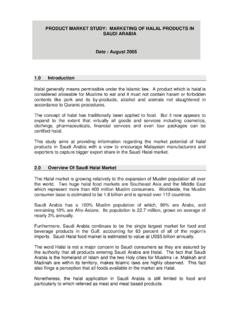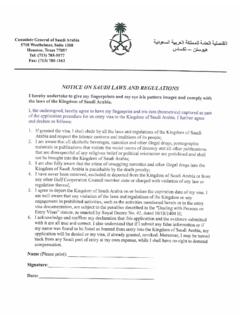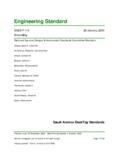Transcription of Saudi Labour Law - Embassy of India, Riyadh
1 Saudi Labour Law Basic Points Labour law governs the employer-employee relations in the Kingdom. A worker is entitled to receive the rights guaranteed by the Labour Law. While some of the BASIC points of the Labour law are outlined below, for further details, the text of the Labour Law available on the Embassy of India website may be referred to. 1. Coverage: (i) Labour law governs the employer-employee relations in the Kingdom. A worker is entitled to receive the rights guaranteed by the Labour Law. For the text of the Labour Law, please visit the website of the Indian Embassy , Riyadh ( ).
2 (ii) All general category expatriate workers (those working in companies/establishments) are covered under the provisions of the Labour Laws. However, domestic service workers (housemaids, house drivers, gardeners, etc.), agriculture workers in firms employing less than 10 workers, crew working on ships having a load of less than 500 tonnes, workers on short term visa work visa, etc. are not covered by the Labour Law. 2. Employment contract: (i) A written employment contract signed by the employer and an expatriate employee is compulsory, specifying a fixed duration, usually two years.
3 (ii) The contact shall be in Arabic. However, if it is in another language along with Arabic, in case of dispute, the Arabic text shall prevail. (iii) The contract shall include the name and address of the employer and the employee, job title, location of work, duration of contract, probation period, wage agreed upon, provision of free food or food allowance and accommodation, working hours, overtime allowance, vacation, air passages, medical insurance, end of the service benefits, provision in regard to disposal or transportation of mortal remains to India in case of demise of the employee, mode of settlement of disputes, etc.
4 3. Probation Period: (i) Probation period, if provided in the employment contract, is usually not exceeding 90 days. It may, however, be extended up to 180 days with the written agreement of the parties. (ii) During probation either party may terminate the agreement without payment of compensation or end of service benefits, though cost of return journey is to be borne by the worker. 4. Working hours/Weekly Holiday/Overtime allowance: (i) Working hours are 8 hours daily and 48 hours per week. During the month of Ramadan, the working hours are reduced to six hours a day and 36 hours a week, for Muslim workers.
5 (ii) Overtime rates are 150% of the hourly wage. (iii) Friday is the weekly rest day which may be replaced with any other day of the week. (iv) Rest period of 30 minutes during work day is provided and the worker shall not be made to work for more than 5 hours continuously. In no case total working hours should 12 hours per day. 5. Accommodation: (i) It is the responsibility of the employer to provide residential accommodation or house rent allowance in lieu of it as provided in the employment contract. 6. Food or food allowance: It is the responsibility of the employer to provide food or food allowance as per the employment contract.
6 7. Fees for Recruitment fees, iqama, exit/re-rentry, exit visa etc. (i) Employers shall incur the fees pertaining to the recruitment, medical tests, fees of the residence permit (iqama), their renewal and fines resulting from any delay as well as fees pertaining to exit and re-entry visas. 8. Medical/Health Insurance: (i) It is mandatory for employers to provide their expatriate workers health insurance which is necessary for workers to access medical treatment. (ii) Soon after arrival, in order to obtain the medical insurance, which is a pre-requisite for issuing Iqama, a worker has to undergo a medical test at approved medical centres.
7 9. Leave: (i) Annual Leave: 21days if the worker has completed one year of service; and 30 days after 5 years of continuous service with the same employer. (ii) Medical leave: First 30 days sick leave with full wage; next 60 days with 3/4th of wage; and without pay for the following 30 days in a single year. (iii) Paternity Leave: 3 day s leave on the birth child. (iv) Maternity Leave: 10 weeks - four weeks before the expected date of delivery and six weeks after the delivery, extendable by one month without pay. Leave salary admissible is half the salary, if served with the employer for one year, and full salary if the service is for three years or more.
8 (v) Other Types of leave: Death of spouse or children: 5 days leave will be allowed. A female employee, in the event of death of her husband is entitled to 15-130 days leave depending on her religion. Haj: Paid leave of 10-15 days once during service is allowed for performing Haj for an employee who has previously not performed Haj, after completing two years of service. (vi) Public Holidays: Saudi National Day, Eid al-Fitr and Eid al-Adha are fully paid holidays and if the workers required to work, they are entitled to overtime.
9 10. Cost of Air ticket: (i) Employer has to bear the airfare of the workers from home country to Saudi Arabia for joining work and for their return after completion of the contract period. (ii) However, the cost of air ticket must be borne by the worker if his contract is terminated during probation period, he fails medical test, or terminated his employment for his own fault. 11. Renewal of employment contract: (i) As per the Saudi Labour law, a fixed term contract shall terminate upon expiry of its term and the sponsor must repatriate the worker. (ii) If both parties continue to implement the contract, it shall be deemed renewed for an indefinite period subject the provision that a non- Saudi contract which has no specific duration, the duration of the work permit shall be duration of the contract.
10 (ii) If the fixed-term contract incorporates a clause providing for its renewal for a similar term or a specified term, the contract shall be renewed for the period agreed upon. (iii) If a fixed term contract is renewed for two consecutive terms or if the original contract term and the renewal period amount to three years, whichever is less, and the two parties continue to implement it, the contract shall become an indefinite term contract. (iv) In case the worker wishes to return home on expiry of the existing contract, notice of his intention to leave the employment may be given in 30 days (in fixed term contract)/60 days (in indefinite term contract) before expiry of the contract.










